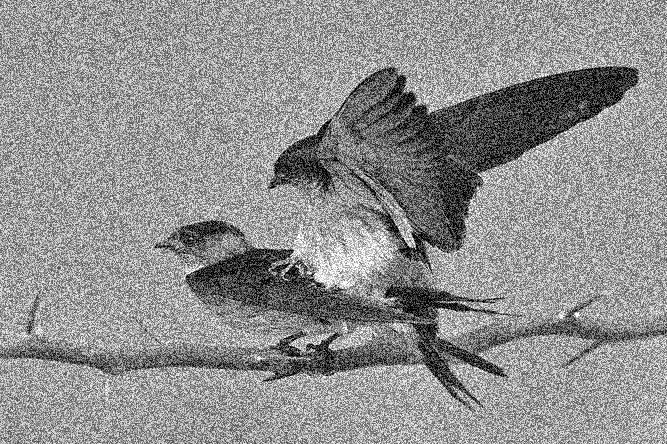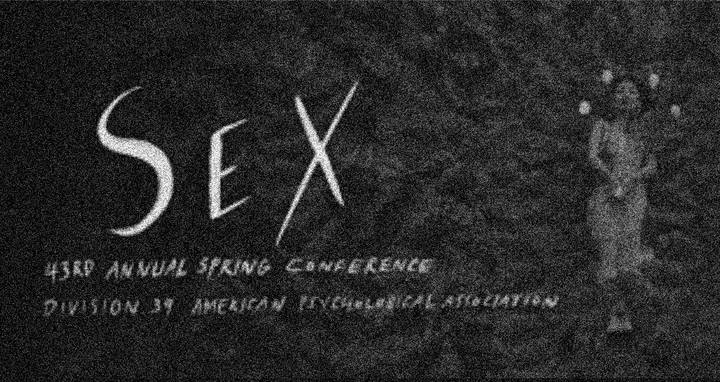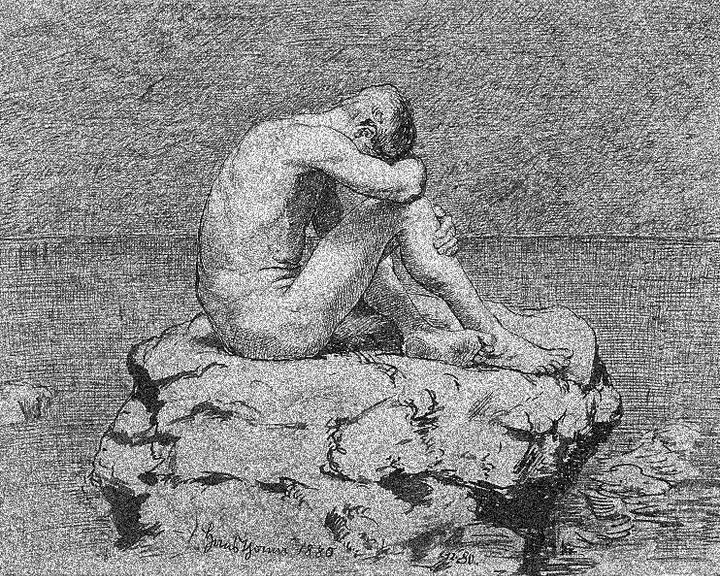The Anus: An FAQ, Part One
When we call someone “anal,” we typically understand what is meant, but we do not understand as well what it is that we are understanding.

“There where it smells of shit, it smells of being.”
Antonin Artaud
Q: Why is the anus disgusting?
When we call someone “anal,” we typically understand what is meant, but we do not necessarily understand what it is we are understanding: namely, that there is a link between an orifice and an entire characterological pattern that is strong enough to make this particular synecdoche (if that’s what it is) quite commonplace. While the connection between bodily and parsimonious assholes long predates the twentieth century, it was Sigmund Freud in Three Essays on a Theory of Sexuality who first introduced the term “anal” as it is used today. Beginning with a categorical affirmation of the sexual significance of the anus, Freud first raises the issue of disgust: “Those who condemn [the sexual use of the anus] are giving way to an unmistakable feeling of disgust, which protects them from accepting sexual aims of the kind.” It is not at all obvious, however, what precisely is disgusting here. As he immediately goes on to say:
I hope, however, I shall not be accused of partisanship when I assert that people who try to account for this disgust by saying that the organ in question serves the function of excretion and comes in contact with excrement—a thing which is disgusting in itself—are not much more to the point than hysterical girls who account for their disgust at the male genital by saying that it serves to void urine.
In other words, people act no different than Freud’s early clientele when they chalk up the disgust they feel toward the anus to the simple fact that feces come out of it. But if the association with un-hygienic excrement is not the source of its repugnance, why is the anus, and particularly its employment toward sexual aims, disgusting?
In a previous discussion of orality, Freud contends that the limits of disgust are “purely conventional: a man who will kiss a pretty girl’s lips passionately may perhaps be disgusted at the idea of using her toothbrush, though there are no grounds for supposing that his own oral cavity, for which he feels no disgust, is any cleaner than the girl’s.” Though it is difficult to imagine an activity involving the anus becoming as widely-accepted as the kiss, the lesson here must apply equally to anality: while it is easy to be deceived into thinking the anus is naturally revolting, our disgust toward it is similarly conventional. Why this is so remains unanswered, but Freud has made one thing clear: not only does “the sexual instinct” not find anything disgusting about the anus, it is, in fact, positively attracted to it. If disgust is “one of the forces which have led to a restriction of the sexual aim,” it is not, in the case of the anal orifice, a natural disgust at its products that is the problem but rather a disgust of convention, and thus an acquired disgust. Our sexual instincts, in other words, take no issue with feces.
Indeed, the “contents of the bowels, which act as a stimulating mass upon a sexually sensitive portion of the mucous membrane” behave much like “forerunners of another organ, which is destined to come into action after the phase of childhood.” Freud would clarify, in a later paper, that the “fecal mass, or as one patient called it, the fecal ‘stick,’ represents as it were the first penis, and the stimulated mucous membrane of the rectum represents that of the vagina.”
It was under the Trocadero Bridge in 1964. It was terribly cold, you remember? The famous winter of 1964. Alphonsine’s hands were so cold. She’d grabbed my prick to warm them and she was wanking me. It was so cold, everything was frozen. Alphonsine said: “What a huge prick you’ve got!” “You fool, I’m shitting,” I said.
Before intercourse, in other words, there was intracourse; before penetration by/of the other, there was a more primordial self-penetration. Not only are the anus and its expulsions not obstacles to our sexual desire, but defecating is, in fact, the basic template for sex. One might even read Freud as saying that defecation is the way children get off.
One can imagine the shock at the typical adult response to this primal pleasure. That an act so natural—to go in one’s pants, on the floor, whenever one desires, whenever the urge is there—could arouse such negative affect, and sometimes even punishment: surely no other encounter makes the human world seem so uninhabitable. What children learn from these moments when they offend the aesthetic preferences of their caretakers, and thus make themselves unbeautiful, is that there is a reality to which they must accord themselves if they wish to be worthy of love. To be loved, one must defecate at appropriate times and in appropriate spaces. There is no more basic precondition of human relatedness, and this is why time and space are, for Kant, the most basic intuitions.
Q: What does the anus mean?
This lesson is complicated by the “astounding” number of “tasks and performances [that] can symbolize in the unconscious the act of defecation.” According to Michael Eigen, “no body area is a more highly invested pivotal point for associations than the anus,” which plays “the most extensive role in knitting the body together in the realm of meaning.” Freud’s first stumbling articulation of this idea is disorienting:
the contents of the bowels… are clearly treated as a part of the infant’s own body and represent his first ‘gift’: by producing them he can express his active compliance with his environment and, by withholding them, his disobedience. From being a ‘gift’ they later come to acquire the meaning of ‘baby’—for babies, according to one of the sexual theories of children, are acquired by eating and are born through the bowels.
Of the many striking features of this passage, which reads more like a free association than a developmental explanation, the “gift” elaboration is perhaps the most immediately noteworthy; for if the child’s feces is indeed a gift, it is clearly no ordinary one. It is not a freely offered token of appreciation or celebratory gesture but rather a sign of “active compliance with one’s environment.” Perhaps Freud is making a Maussian point about gifts: that they are unconsciously given according to the same logic by which children do and do not defecate in response to the demands of their parents. Perhaps he is also, by extension, making a point about babies: that while consciously welcomed into the world as miraculous “gifts,” they are unconsciously birthed in active compliance (with the strictures of femininity, with biological “destiny,” etc.).
Freud’s colleague and first biographer, Ernest Jones, explains the feces-baby connection as follows:
In the young child’s spontaneous phantasy the abdomen is merely a bag of undifferentiated contents into which food goes in and out of which feces come. The knowledge that the fetus grows in the mother’s abdomen… leads to the natural inference that it grows out of food… [and that it] leaves the body through the only opening through which [the child] has ever known solid material leave it—namely, the anus…. The baby is thus something that in some special way has been created and formed out of feces; feces and children are, after all, the only two things that the body can create and produce, and the impulse to do so is remarkably similar in the two cases.
This understandable confusion lays the groundwork for a number of comforting fantasies, including a) that one can have babies just like mother and b) that new siblings, rivals in affection, are in effect excrement. In what would eventually amount to a revolution in psychoanalytic theory, Melanie Klein made a disturbing addition to this list: that in addition to “oral-sadistic impulses to rob the mother’s body of its good contents,” the child also bears “anal-sadistic impulses to put his excrements into her (including the desire to enter her body in order to control her from within).” The feces-baby connection thus makes possible the fantasy c) that one might put oneself back into one’s mother as a baby and thereby get her to do exactly as one wishes.
Q: Why is the anus the site of ambivalence?
In all of these fantasies the difficulty of reality is avoided: one is not separate from one’s mother, whom one can control from within, and one’s siblings are excrement. It thus seems necessary that children pursue a dual mastery. On the one hand, they learn that there are pre-conditions to love, that they must be in (partial) control of themselves in reality in order to be loved (as just discussed, the acquisition of sphincter control and the emergence of reality are, in psychoanalytic theory, the same process). On the other hand, since this reality is simply too overwhelming and difficult to directly confront, children must also be in control of themselves in fantasy in order to be loved. What is most noteworthy here is that in both cases the anus stands out as the body part through which one makes oneself worthy of being loved. Between control and love (and one might also say, power and sex) lies the anus.
It is easy to make cute, abstract summations of this kind, but Freud thinks this drama is played out every time we sit on the pot. “Violent muscular contractions” and “powerful stimulation of the mucous membrane” cause “not only painful but also highly pleasurable sensations.” He thus finds it unsurprising that excessively controlling people, and in particular people who invest a great deal in their capacities for control as they relate to the gaining and maintaining of love (Freud calls them “obsessive neurotics”), very often have intestinal difficulties, hemorrhoids, and constipation, not to mention “special scatological practices, ceremonies, and so on, which they carefully keep secret.” Even the simple preference to go in private is, for Freud, imbued with repressed anal pleasure, and thus evidence that no one fully escapes the difficulties encountered in the love/control nexus.
Freud gives a particular name to the charge that this nexus bears: ambivalence. Unlike the mouth, which tends to have in psychoanalytic theory a single vector (devouring, sucking, etc.), the anus is a site of ineliminable contradiction: vagina/penis, shitting/copulating, love/control all find articulation. Relying as he always did on biology, Freud would attribute this ambivalence to the anus’ descendance from “the old, undifferentiated cloaca,” a common cavity in non-mammalian vertebrates for both excretory and genital products. The very existence of the anus, Freud seemed to believe, bears the evolutionary dissatisfaction of separation; no wonder, then, that it would be a natural erotogenic home for ambivalence.
In “‘Anal’ und ‘Sexual’” (1916), a rich meditation that would influence Freud’s later additions to the Three Essays, Lou Andreas-Salomé puts a positive spin on this ambivalence in juxtaposing anal and oral kinds of love. In the “meeting of breast and mouth,” the paradigmatic oral act, “there is an apparent identity of self and outside world;” love is thus, in its oral manifestation, not a meeting of two selves but “a restless merging of individual and world,” a kind of primordial unity that is abruptly sundered by the prohibition and punishment encountered by the “anal libido.” The lesson that defecation has to teach us, for Andreas-Salomé, is nothing less than “I am not one with my mother.” While admitting that this realization is traumatic in one sense, she finds it lamentable that we do not also celebrate the pleasure of separation, that we greet this “new duality of world and I” with “shame and disgust” instead.
The fundamental question Andreas-Salomé considers is whether it is a good thing that we embrace this duality, that we learn to love in such a way that respects the other-ness of the other. In the repudiation of “two-ness”—I/world, love/control, etc.—evinced in anality’s negative valence, we idealize the Aristophanean quest for reunion with our other half over the kind of love that can occur between two separate individuals. We should, in her view, appreciate the fact that love and control are brought together in the anal stage. Without the self-limitation that anal mastery brings, we could only love others in the exhaustingly immoderate way in which infants love their mothers. Control of the anal sphincter thus brings with it an accommodation to finitude, an acceptance that our erotic lives do not “run rigidly in a straight line” but rather “reverse back on themselves.” Echoing her early friend Friedrich Nietzsche, Andreas-Salomé concludes that overcoming the “guilt-conflict” bound up in anal disgust means accepting “two-ness,” and thereby opening oneself to the “fullness of life.”
■
In Part Two of “The Anus”: retention, expulsion, and the curious tale of the rat man. Available here.
Paola Domínguez-Sosa is Sándor Ferenczi Professor of Mutual Analysis at the Sociedade Brasileira de Psicanálise and the author of Ñao entre no buraco, translated as Walk, My Friends, in the Light of Day (Johns Hopkins, 2014).



